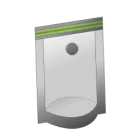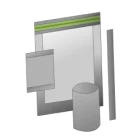Top Eco-Friendly Packaging Supplier Delivering Premium Sustainable Solutions for Businesses & Industries
Eco-friendly packaging is a growing trend in the business world, driven by increasing consumer awareness of environmental issues and the need for sustainable practices. It refers to packaging solutions that minimize environmental impact by using materials and processes that are recyclable, biodegradable, compostable, or reusable. The food industry is one of the largest contributors to packaging waste. By adopting eco-friendly packaging, businesses can play a significant role in reducing global waste and promoting sustainability on a larger scale. Eco-friendly packaging for food is becoming increasingly important as consumers, businesses, and governments recognize the environmental impact of traditional packaging materials.
Innovations in product packaging are transforming industries by enhancing sustainability, functionality, and consumer experience. Replacing plastic, seaweed-based wraps and pouches are fully biodegradable and even edible. Advanced bioplastics, such as PHA (polyhydroxyalkanoates), decompose naturally and offer a sustainable alternative to traditional plastics.
Traditional food packaging, especially single-use plastics, contributes significantly to pollution. Eco-friendly packaging materials use biodegradable, compostable, or recyclable materials that break down naturally, reducing the amount of waste that ends up in landfills, oceans, and ecosystems. Entrepouch eco-friendly packaging supplier provides innovative solutions in eco-friendly packaging for the food industry aligns with the principles of a circular economy, where materials are reused, recycled, or composted instead of being discarded. This reduces waste and promotes the efficient use of resources.
Sustainable, versatile, and functional packaging materials
Eco-friendly packaging materials such as glass, aluminum, cardboard, and certain plastics (e.g., PET, HDPE) can be easily recycled, reducing the demand for virgin raw materials. Eco-friendly packaging for food is not only sustainable but also versatile and functional. Materials like bamboo, mushroom packaging, and recycled paper can be used for a wide range of food products, from fresh produce to ready-to-eat meals.
Sustainable materials like wax-coated paper, mushroom packaging, and bio-based films offer moisture resistance, breathability, and insulation to keep food fresh longer. Many eco-friendly alternatives, including pulp-based trays and biodegradable plastics, generate significantly lower greenhouse gas emissions during manufacturing and disposal.
As industries move toward eco-friendly solutions, paper-based packaging is evolving with innovations that enhance durability, moisture resistance, and functionality. Our solutions in paper packaging include the below:
· Kraft Paper: Strong and durable, kraft paper is widely used for wrapping, bags, and takeaway boxes. It is made from wood pulp and is fully recyclable.
· Corrugated Cardboard: Common in shipping and retail packaging, corrugated boxes offer cushioning and protection while being lightweight and recyclable.
· Molded Pulp Packaging: Made from recycled paper or natural fibers, molded pulp is used for egg cartons, drink carriers, and protective packaging for electronics.
· Waxed or Coated Paper: Paper coated with wax, biodegradable films, or polyethylene enhances moisture resistance, making it ideal for food wraps and disposable cups.
Packing peanuts for comprehensive protection against impact and pressure
As the leading eco-friendly packaging suppliers of the Philippines, Entrepouch provides the best quality packing peanuts which are used primarily for protecting fragile items during shipping and storage. They fill empty spaces in boxes, preventing movement and absorbing shocks to reduce the risk of damage. Online retailers and shipping companies use our packing peanuts to secure delicate products like electronics, glassware, and collectibles. They cushion items against drops, vibrations, and impacts, and prevent movement by filling empty spaces inside a box.
Traditionally made from polystyrene (a type of plastic foam), packing peanuts come in different shapes and sizes. Businesses rely on packing peanuts to ensure that delicate products, including ceramics, computer components, and medical devices, arrive at their destinations safely. Unlike other packing materials, such as air pillows or bubble wrap, packing peanuts can reach into small spaces and completely surround objects, providing comprehensive protection against impact and pressure.









